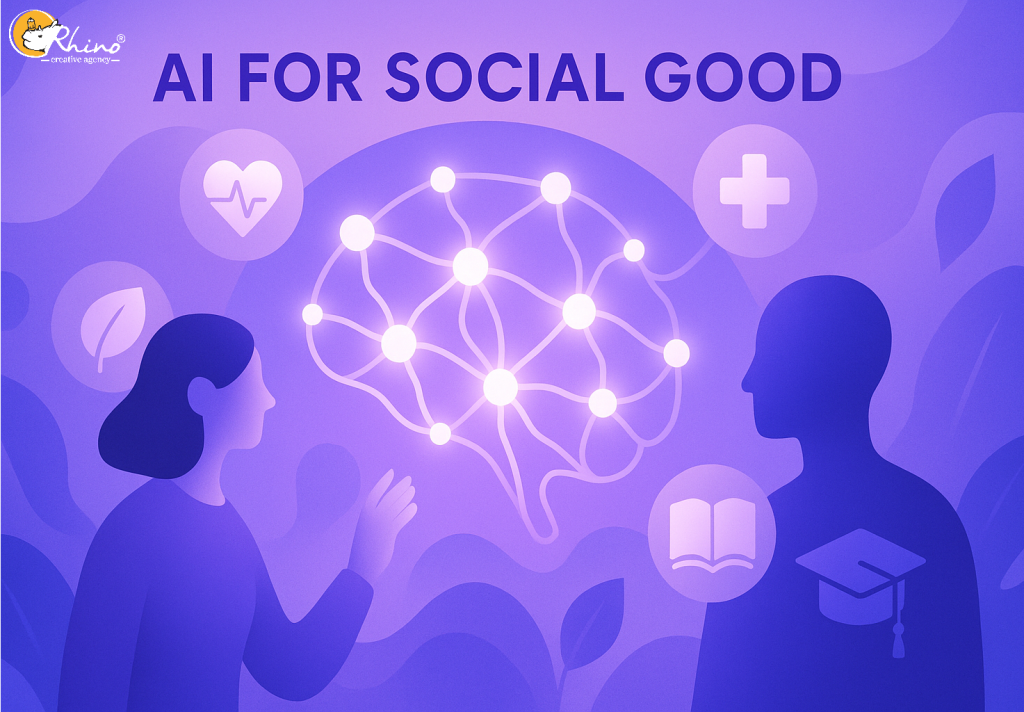AI for Social Good: Harnessing Technology to Address Global Challenges Artificial intelligence (AI) has emerged as a transformative force, with its influence extending beyond commerce and entertainment into the realm of social impact. The concept of “AI for Social Good,” or AI4Good, represents a growing movement dedicated to leveraging AI technologies to solve pressing global challenges and advance human well-being. This intentional application of AI is increasingly being aligned with the United Nations’ Sustainable Development Goals (SDGs), focusing on a future that is more inclusive, sustainable, and equitable. While the commercial applications of AI are well-established, its potential to address humanitarian crises, environmental degradation, and societal inequalities offers a profound opportunity to shape a better future for all.
AI for Social Good initiatives are active across a wide range of sectors, demonstrating the technology’s versatility and potential. In healthcare, AI-powered diagnostic tools are enabling the early detection of diseases like cancer and cardiovascular conditions, leading to improved patient outcomes. Furthermore, telemedicine platforms are using AI to provide remote medical consultations, bridging the healthcare gap in underserved communities. Education is another area benefiting significantly from AI. Personalized learning platforms analyze student performance and learning styles to create customized content, a particularly valuable tool in regions with limited access to qualified teachers. Beyond human-centric applications, AI is proving critical for environmental conservation and climate action. AI models can analyze satellite imagery to monitor deforestation in real time, predict natural disasters such as floods and hurricanes, and optimize energy grids to reduce waste and promote sustainability. For instance, Google’s flood forecasting initiative has expanded to cover over 100 countries, providing timely alerts that can save lives.
Recent projects highlight the tangible impact of AI4Good in action. In agriculture, a chatbot named Ulangizi, developed by Opportunity International, provides personalized farming advice in the local language to farmers in rural Malawi. By using natural language processing, it helps them with crop management and climate adaptation, thereby improving yields and food security. In waste management, companies like Greyparrot are using AI and computer vision to automatically sort waste, diverting millions of tons of recyclables from landfills. This demonstrates how AI can modernize traditionally low-tech industries for environmental benefit. Humanitarian efforts are also being streamlined; the International Rescue Committee’s Signpost project uses an AI chatbot to provide critical information to displaced individuals around the clock, helping them navigate complex and often dangerous situations. These examples illustrate a clear trend: AI is moving from theoretical promise to practical application, delivering measurable social benefits.
Despite its vast potential, the implementation of AI for Social Good is not without significant challenges and ethical considerations. A primary concern is the issue of bias and discrimination. AI systems are trained on vast datasets, and if this data reflects existing societal prejudices, the AI can perpetuate and even amplify those biases. This can lead to discriminatory outcomes in areas such as credit scoring, hiring, and even criminal justice. Another major challenge is the “black box” problem, where the decision-making process of a complex AI algorithm is opaque and difficult for humans to interpret. This lack of transparency raises questions of accountability, especially when an AI system’s error leads to real-world harm. Moreover, privacy and data security are paramount, as AI initiatives often rely on large amounts of personal and sensitive data. The potential for misuse of this data, or its exploitation by malicious actors, necessitates robust safeguards. Lastly, there is a risk of economic disruption and job displacement, as AI-driven automation may displace workers, exacerbating income inequality. Addressing these issues requires a proactive, collaborative approach involving policymakers, technologists, ethicists, and the communities affected.
Looking ahead, the future of AI for Social Good is shaped by several key trends. The rise of multimodal AI, which can process and integrate information from various sources like text, images, and video, will enable more nuanced and effective solutions for complex problems. The increasing accessibility of AI through user-friendly, low-code platforms will empower a wider range of organizations, including smaller non-profits and social enterprises, to develop their own solutions without needing a large team of data scientists. Furthermore, a growing emphasis on explainable AI (XAI) and responsible innovation will push for greater transparency and accountability in AI systems. The McKinsey 2024 report on AI for Social Good highlights a strong belief among experts that AI has the highest potential to make a difference in health, education, climate action, and sustainable communities. By fostering collaboration across public and private sectors and establishing clear ethical guidelines and standards, the global community can navigate these challenges and ensure that AI becomes a powerful catalyst for positive, inclusive, and sustainable change.

